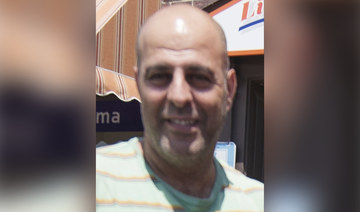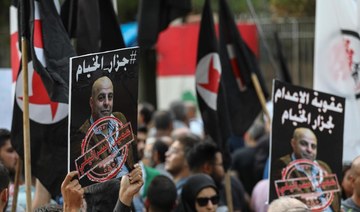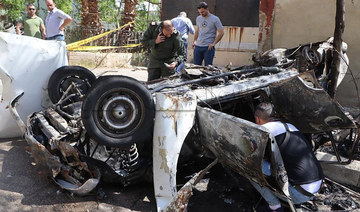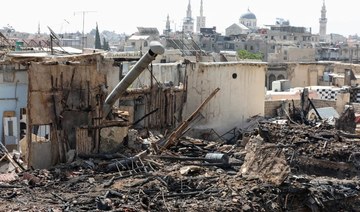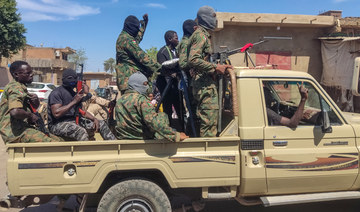CONCORD, N.H.: A Lebanese American man’s survivors, who filed an ambitious lawsuit last year alleging Lebanon’s security agency kidnapped and tortured him before he died in the U.S., hope to find an opening after the agency recently responded in an American court.
Amer Fakhoury died in the United States in August 2020 at age 57 after suffering from stage 4 lymphoma. His family’s suit says he developed the illness and other serious medical issues while imprisoned during a visit to Lebanon over decades-old murder and torture charges that he denied.
Fakhoury’s detention in 2019 and release in 2020 marked another strain in relations between the United States and Lebanon, which finds itself beset by one of the world’s worst economic disasters and squeezed by tensions between Washington and Iran.
Recently, lawyers representing Lebanon’s security agency, the General Directorate of General Security, asked to intervene in the Fakhoury family’s wrongful death lawsuit to have the allegations against it stricken. Lebanon is not named as a defendant in the suit, which targets Iran.
In its filing, the Lebanese security agency claimed the lawsuit falsely accuses it and its director of “serious crimes of kidnapping, torture and killing at the direction or aid of alleged terrorist organizations.”
In turn, the Fakhourys’ lawyer, Robert Tolchin, has asked a judge for permission to formally sue Lebanon, along with Iran. He referred to Lebanon’s action in the family’s response as “a very strange and unusual motion filed by a nonparty.”
The family’s lawsuit filed in Washington in May initially argued it was possible to sue Iran under an exception to the Foreign Sovereign Immunities Act as it has been designated as a “state sponsor of terrorism” since 1984. The suit also described Hezbollah, now both a dominant political and militant force in Lebanon, as an “instrument” of Iran.
Iran has yet to respond to the lawsuit. It has ignored others filed against it in American courts in the wake of the 1979 Islamic Revolution and U.S. Embassy hostage crisis. Iran’s mission to the United Nations did not respond to a request for comment.
Similar lawsuits against Iran have won financial judgments, though receiving a payout can be complicated. Any award could come from the United States Victims of State Sponsored Terrorism Fund, which has distributed funds to those held and or affected by the hostage crisis.
Regarding Lebanon, Tolchin said the Fakhourys’ lawsuit would not make sense without the allegations against Lebanon's security agency.
“We interpret that as a waiver of sovereign immunity,” he said to The Associated Press of the agency’s request. “You can’t come in and ask for affirmative relief on the merits, and, at the same time, claim to be immune.”
In a statement provided to The AP, an attorney for the agency, David Lin, said the Fakhourys’ position “that Lebanon or our client somehow waived sovereign immunity by seeking to strike baseless material from the complaint is baffling and wrong as a matter of law.”
A judge pushed back a deadline for the lawyers representing the security agency to respond to the Fakhoury’s request to sue by Jan. 26.
Mary Ellen O’Connell, a professor at the Notre Dame Law School, said it may be challenging for a case to be brought against Lebanon, which is not designated a “state sponsor of terrorism."
“Not having that listing will be difficult to go after Lebanon, as opposed to Iran,” she said.
O’Connell also said a move like Lebanon's to strike the allegations “is usually not accepted by the courts as a waiver” of sovereign immunity.
Fakhoury’s imprisonment in Lebanon took place in September 2019, not long after he became an American citizen. Fakhoury visited his home country on vacation for the first time in nearly 20 years. A week after he arrived, he was jailed and his passport was seized, his family has said.
The day before he was taken into custody, a newspaper close to the Iranian-backed Shiite group Hezbollah published a story accusing him of playing a role in the torture and killing of inmates at a prison run by an Israeli-backed Lebanese militia during Israel’s occupation of Lebanon two decades ago. Fakhoury was a member of the South Lebanon Army.
The article dubbed him the “butcher” of the Khiam Detention Center, which was notorious for human rights abuses. Fakhoury’s family said he had worked at the prison as a member of the militia, but that he was a clerk who had little contact with inmates. When Israel withdrew from Lebanon in 2000, Fakhoury left the country like many other militia members who feared reprisals.
Upon his return to Lebanon in 2019, Fakhoury was held for five months before he was formally charged, his family said. By then, he had dropped more than 60 pounds, was suffering from lymphoma, and had rib fractures, among other serious health problems, they said.
In its request to intervene, the security agency said Fakhoury was not kidnapped, but was “lawfully detained” for investigative purposes and then “handed off” to another agency responsible for prosecuting the alleged crimes. It called the allegations “scandalous, impertinent, and highly damaging.”
The family's suit alleges security personnel made him watch as they beat prisoners and kept him isolated in an interrogation room, where he faced verbal and physical abuse with a black sack placed over his head. The lawsuit also claims Fakhoury was threatened with execution unless he signed a declaration saying he was guilty of the accusations mentioned in the newspaper article.
Eventually, the Lebanese Supreme Court dropped the charges against Fakhoury. He was returned to the United States on March 19, 2020, on a U.S. Marine Corps Osprey aircraft. He died five months later.
The lawsuit also linked Fakhoury’s eventual release to the U.S. government's decision in June 2020 to free Kassim Tajideen, a Lebanese businessman who was sentenced to five years in prison for providing millions of dollars to Hezbollah.
The Fakhourys' suit called it a “quid-pro-quo prisoner exchange.” However, Tajideen’s lawyer and the U.S. State Department at the time denied he was part of a prisoner exchange.
Fakhoury first arrived in the United States in 2001. He started a restaurant in Dover, New Hampshire, with his wife and put their four daughters through college. But his family said he felt Lebanon was still home, even though other members of his militia had been targeted in the years after the war.
As early as 2018, Fakhoury had sought assurances from the U.S. State Department and the Lebanese government that he could visit Lebanon freely. His family said he was told there were no accusations against him in Lebanon or no legal matters that might interfere with his return.
After his death, the Fakhourys started a foundation in his name dedicated to helping the families of hostages.
“This is a fight not just for us,” Guila Fakhoury, the oldest of Fakhoury’s four daughters, said in an interview about the lawsuit. “This a fight for our father and a fight for every American who is illegally detained, and for every person who is illegally detained.”
The lawsuit seeks financial damages and a jury trial.
“I know my dad will not rest in peace until we have justice for what has been done to him,” Fakhoury said.
Family seeks to sue Lebanon over dead father's captivity
https://arab.news/nv7qh
Family seeks to sue Lebanon over dead father's captivity
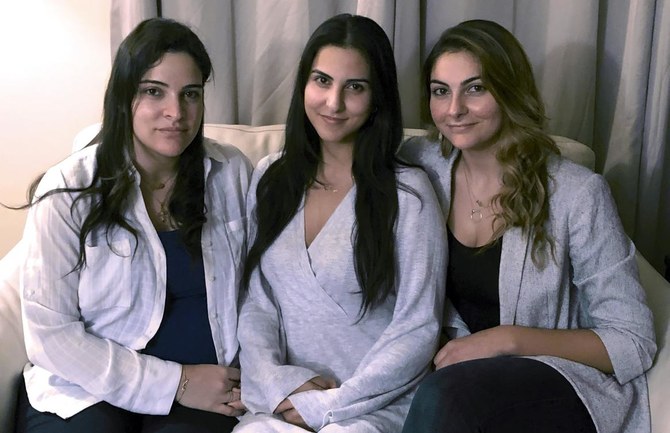
- His family’s suit says he developed the illness and other serious medical issues while imprisoned during a visit to Lebanon
- The Fakhourys’ lawyer, Robert Tolchin, has asked a judge for permission to formally sue Lebanon, along with Iran
Syria says Israeli strike outside Damascus injures eight troops
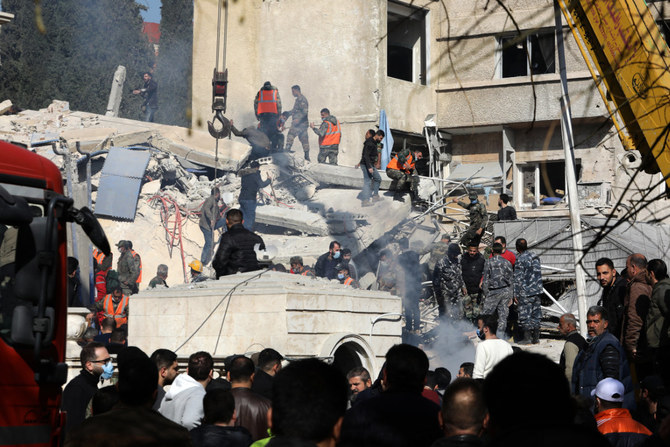
- A security source said the strike hit a building operated by government forces
- Defense ministry acknowledged only that the strike caused some material damage
An Israeli airstrike on the outskirts of Damascus injured eight Syrian military personnel late on Thursday, the Syrian defense ministry said, the latest such attack amid the war in Gaza.
The Israeli strike, launched from the occupied Golan Heights toward “one of the sites in the vicinity of Damascus,” caused some material damage, the Syrian defense ministry said in a statement.
The strike hit a building operated by Syrian security forces, a security source in the alliance backing Syria’s government earlier told Reuters.
The Israeli military said it does not comment on reports in the foreign media.
Israel has for years been striking Iran-linked targets in Syria and has stepped up its campaign in the war-torn country since Oct. 7, when Iran-backed Palestinian militants Hamas crossed into Israeli territory in an attack that left 1,200 people dead and led to more than 250 taken hostage.
Israel responded with a land, air and sea assault on the Gaza Strip, escalated strikes on Syria and exchanged fire with Lebanese armed group Hezbollah across Lebanon’s southern border.
The security source said the location struck in Syria on Thursday sat just south of the Sayyeda Zeinab shrine, where Hezbollah and Iranian forces are entrenched.
But the source said the site struck was not operated by Iranian units or Hezbollah.
Turkiye halts all trade with Israel, cites worsening Palestinian situation

- Turkiye’s trade ministry: ‘Export and import transactions related to Israel have been stopped, covering all products’
- Israel’s FM Israel Katz said that Turkish President Tayyip Erdogan was breaking agreements by blocking ports to Israeli imports and exports
ANKARA: Turkiye stopped all exports and imports to and from Israel as of Thursday, the Turkish trade ministry said, citing the “worsening humanitarian tragedy” in the Palestinian territories.
“Export and import transactions related to Israel have been stopped, covering all products,” Turkiye’s trade ministry said in a statement.
“Turkiye will strictly and decisively implement these new measures until the Israeli Government allows an uninterrupted and sufficient flow of humanitarian aid to Gaza.”
The two countries had a trade volume of $6.8 billion in 2023.
Turkiye last month imposed trade restrictions on Israel over what it said was Israel’s refusal to allow Ankara to take part in aid air-drop operations for Gaza and its offensive on the enclave.
Earlier on Thursday, Israel’s foreign minister said that Turkish President Tayyip Erdogan was breaking agreements by blocking ports to Israeli imports and exports.
“This is how a dictator behaves, disregarding the interests of the Turkish people and businessmen, and ignoring international trade agreements,” Israel’s Foreign Minister Israel Katz posted on X.
Katz said he instructed the foreign ministry to work to create alternatives for trade with Turkiye, focusing on local production and imports from other countries.
Palestinian groups say top Gaza surgeon died in Israeli custody

- Dr. Adnan Ahmed Atiya Al-Barsh died at the Israeli-run Ofer prison in the West Bank last month: advocacy groups
- Latest deaths brought to 18 the number of deaths in Israeli custody since the war began on October 7, groups said
RAMALLAH, Palestinian Territories: Palestinian advocacy groups said Thursday that the head of orthopedics at Gaza’s largest hospital Al-Shifa has died in Israeli custody, alleging he had been tortured during his detention.
Dr. Adnan Ahmed Atiya Al-Barsh died at the Israeli-run Ofer prison in the occupied West Bank last month, the Palestinian Prisoners Affairs Committee and the Palestinian Prisoners Club said in a joint statement.
Contacted by AFP about the reported death in custody, the Israeli army said: “We are currently not aware of such (an) incident.”
Barsh, 50, had been arrested with a group of other doctors last December at Al-Awda Hospital near the Jabalia refugee camp in northern Gaza.
He died on April 19, the prisoners groups said, citing Palestinian authorities.
“His body is still being held,” they added.
The groups said they had also learnt that another prisoner from Gaza, Ismail Abdel Bari Rajab Khadir, 33, had died in Israeli custody.
Khadir’s body was returned to Gaza on Thursday, as part of a routine repatriation of detainees by the army through the Kerem Shalom border crossing, the groups said, citing authorities on the Palestinian side of the crossing.
The groups said evidence suggested the two men had died “as a result of torture.”
They alleged that Barsh’s death was “part of a systematic targeting of doctors and the health system in Gaza.”
The health ministry in Hamas-ruled Gaza said the surgeon’s death amounted to “murder,” adding that it brought to 492 the number of health workers killed in Gaza since the war erupted nearly seven months ago.
The prisoners groups said the latest deaths brought to 18 the number of deaths in Israeli custody since the war began on October 7.
There have been repeated Israeli military operations around Gaza’s hospitals that have caused heavy damage.
Medical facilities are protected under international humanitarian law but the Israeli military has accused Hamas of using Gaza’s hospitals as cover for military operations, something the militant group denies.
The Al-Shifa hospital, where Barsh worked, has been reduced to rubble by repeated Israeli military operations, leaving what the World Health Organization described last month as an “empty shell.”
The war started with an unprecedented Hamas attack on southern Israel that resulted in the deaths of 1,170 people, mostly civilians, according to an AFP tally of Israeli official figures.
Israel estimates that 129 captives seized by militants during their attack remain in Gaza. The military says 34 of them are dead.
Israel’s retaliatory offensive against Hamas, has killed at least 34,596 people in Gaza, most of them women and children, according to the health ministry.
Lebanon urged to conclude working arrangement with EU border agency to prevent illegal migration
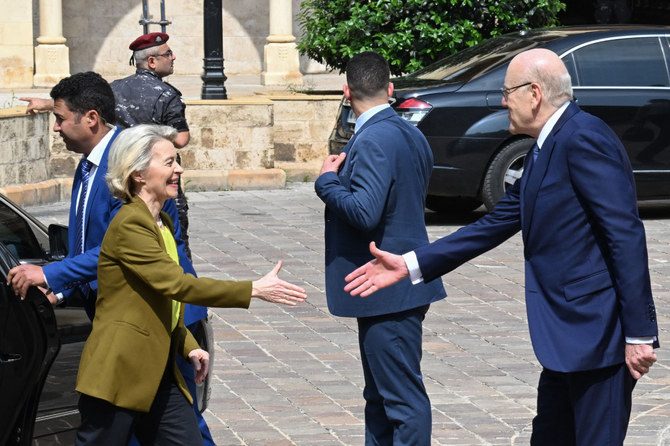
- Berri: Lebanon ready to discuss implementation of UN Resolution 1701 after Gaza aggression ends
- The EU assistance is tied to Lebanon’s need to implement the required reforms and control its borders and illegal crossings with Syria
BEIRUT: The EU has announced an aid package for Lebanon of 1 billion euros ($1.06 billion) to help boost border control and halt the flow of asylum-seekers and migrants from the country across the Mediterranean Sea to Cyprus and Italy.
It comes against a backdrop of increasing hostility toward Syrian refugees in Lebanon and a major surge in irregular migration of Syrians from Lebanon to Cyprus.
The UN High Commissioner for Refugees, meanwhile, has decided to reduce healthcare coverage for registered Syrian refugees by 50 percent.
EU Commission President Ursula von der Leyen said during her visit to Beirut with Cypriot President Nikos Christodoulides that they hoped Lebanon would conclude a “working arrangement” with Frontex, the EU’s border agency.
Von der Leyen said the aid’s distribution will start this year and continue until 2027.
The aid will be dedicated to the most vulnerable people, including refugees, internally displaced people, and host communities.
The EU assistance — which is tied to Lebanon’s need to implement the required reforms and control its borders and illegal crossings with Syria — came in the wake of continued hostilities on the southern front between Hezbollah and the Israeli military.
The two officials arrived in Beirut following the European Council’s special meeting last month.
At the end of the meeting, the council confirmed the EU’s “determination to support the most vulnerable people in Lebanon, strengthen its support to the Lebanese Armed Forces, and combat human trafficking and smuggling.”
It also reaffirmed “the need to achieve conditions for safe, voluntary and dignified return of Syrian refugees, as defined by UNHCR.”
The visit lasted hours in Lebanon and included a meeting with caretaker Prime Minister Najib Mikati and Parliament Speaker Nabih Berri.
Following a tripartite meeting and an expanded discussion in which ministers and security officials participated, Mikati commended the EU’s understanding of the Lebanese state’s demand to reconsider some of its policies regarding assistance to Syrian refugees in the country.
Mikati said: “Lebanon has borne the greatest burden, but it can no longer endure the current situation, especially since the refugees constitute around one-third of Lebanon’s population, which results in additional difficulties and challenges and exacerbates Lebanon’s economic crisis.”
He added: “What is more dangerous is the escalating tension between Syrian refugees and the Lebanese host community due to the crimes that are increasing and threatening national security.”
Mikati emphasized that “Lebanon’s security is security for European countries and vice versa,” adding that “our cooperation on this matter constitutes the real entry point for stability.”
He added: “We refuse to let our country become an alternative homeland, and everyone knows that the solution is political excellence.”
Mikati called for the EU and international actors to recognize that most Syrian areas have become safe, which would facilitate the refugees’ repatriation and allow them to be supported in their home country.
As a first step, those who entered Lebanon in 2016 must go back, as most of them fled for economic reasons and are not considered refugees, said Mikati.
He warned against “turning Lebanon into a transit country to Europe,” saying that “the problems occurring on the Cypriot border are a sample of what might happen if the matter was not radically addressed.”
Von der Leyen, the first European Commission president to visit Lebanon, affirmed her “understanding of the Lebanese position.”
She said: “We want to contribute to Lebanon’s socio-economic stability by strengthening basic services and investments in, for example, education, social protection, and health for the people of Lebanon.
“We will accompany you as you take forward economic, financial, and banking reforms.
“These reforms are key to improving the country’s long-term economic situation. This would allow the business environment and the banking sector to regain the international community’s trust and thus enable private sector investment.”
The EU official said that the support program for the Lebanese military and other security forces “will mainly focus on providing equipment, training and the necessary infrastructure for border management.
“In addition, it would be very helpful for Lebanon to conclude a working arrangement with Frontex, particularly on information exchange and situational awareness.”
She continued: “To help you manage migration, we are committed to maintaining legal pathways open to Europe and resettling refugees from Lebanon to the EU.
“At the same time, we count on your cooperation to prevent illegal migration and combat migrant smuggling.”
Von der Leyen said: “We will also look at how we can make the EU’s assistance more effective. This includes exploring how to work on a more structured approach to voluntary returns to Syria, in close cooperation with UNHCR.”
She also stressed that the international community should strengthen support for humanitarian and early recovery programs in Syria.
Von der Leyen added: “We are deeply concerned about the volatile situation in southern Lebanon, and believe that the security of both Lebanon and Israel cannot be disassociated.
“So, we call for the full implementation of UN Security Council Resolution 1701.
“This needs to be part of a negotiated diplomatic settlement. The Lebanese armed forces are critical here, too, and the EU is ready to work on bolstering their capabilities.”
Christodoulides said that European assistance, which also includes “combating smuggling and managing borders and monitoring them,“ would “enhance the Lebanese authorities’ ability to confront various challenges such as monitoring land and sea borders, ensuring the safety of citizens, combating human trafficking, and continuing counterterrorism efforts.”
The Cypriot president said the “reverberations of the issues and challenges” that Lebanon was facing directly affected Cyprus and the EU.
“We need to work with our partners and UNHCR to discuss the issue of voluntary returns and reconsider the situation of some areas in Syria.”
He emphasized that Lebanon must implement the “necessary and deep reforms in line with the International Monetary Fund’s demands and address issues of accountability, and Cyprus will support Lebanon’s efforts to elect a new president, a development that will send a strong political and symbolic message for change and moving forward.”
Parliament Speaker Berri told the European official that Lebanon “does not want war, and since the moment the Israeli aggression began, it has remained committed to the rules of engagement, which Israel continues to violate, targeting the depth of Lebanon, not sparing civilians, media personnel, agricultural areas, and ambulances, using internationally banned weapons.”
Berri said that Lebanon, “while awaiting the success of international efforts to stop the aggression on the Gaza Strip, which will inevitably reflect on Lebanon and the region, will then be ready to continue the discussion on the implementation of UN Resolution 1701, to which Lebanon was and still is committed and adheres.”
Berri urged “the concerned parties to engage with the Syrian government, which now has a presence over most of its territories, in addressing the refugee issue.”
Red Cross says gunmen kill two of its drivers in Sudan
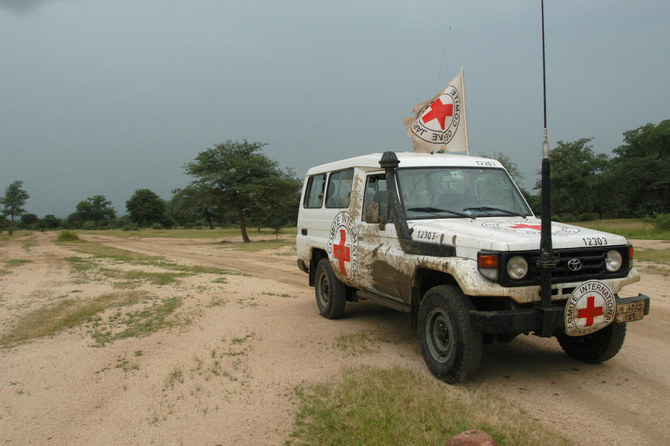
- The team was on its way back from Layba to assess the humanitarian situation of communities affected by armed violence
- “We are in deep mourning for our dear colleagues,” said Pierre Dorbes, head of the ICRC delegation in Sudan
GEENVA: Gunmen killed two drivers working for the International Committee of the Red Cross in war-torn Sudan on Thursday and injured three other staff, the ICRC said.
“The team was on its way back from Layba to assess the humanitarian situation of communities affected by armed violence in the region when the incident occurred” in South Darfur, the ICRC said in a statement.
“We are in deep mourning for our dear colleagues. We extend our sincere condolences to their families, and we hope for a speedy recovery for our injured co-workers,” said Pierre Dorbes, head of the ICRC delegation in Sudan.
A brutal conflict between the Sudanese army led by General Abdel Fattah Al-Burhan and the paramilitary Rapid Support Forces of his ex-deputy Mohamed Hamdan Dagalo has torn the country apart for more than a year.
The war has killed tens of thousands of people and forced millions more to flee their homes in what the United Nations has called the “largest displacement crisis in the world.”
It has also triggered acute food shortages and a humanitarian crisis that has left the northeast African country’s people at risk of starvation.



